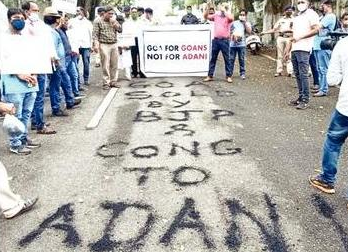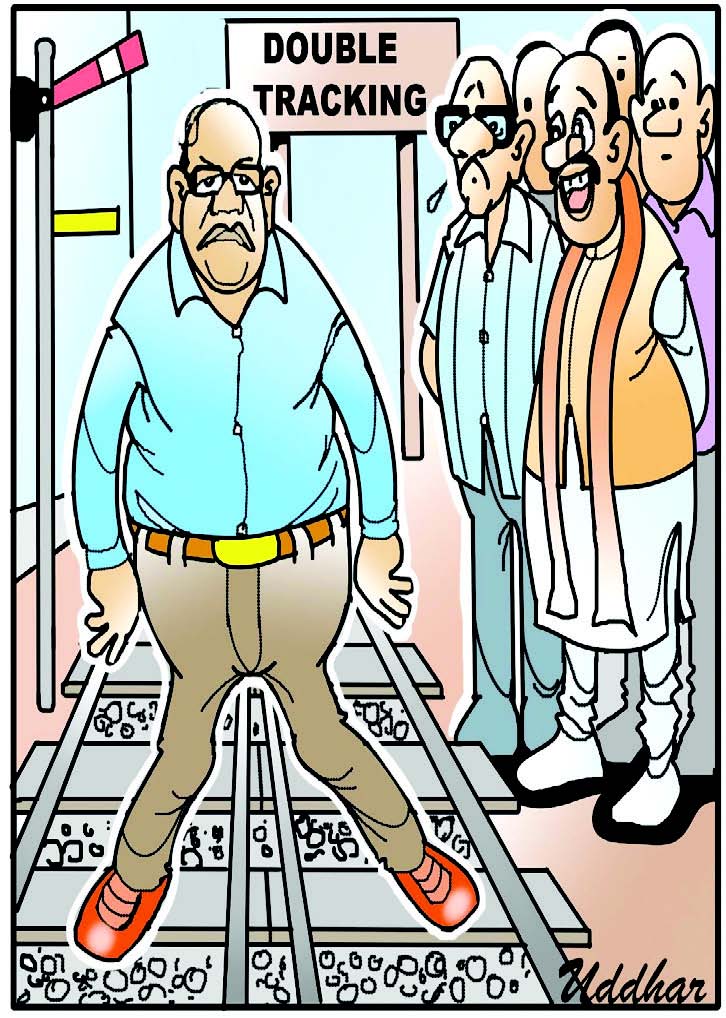
Radharao F. Gracias
My friend since young, a fellow villager and owner of a pharmacy, Roque Gonsalves walks in. As we reminisce, he reminds me of a meeting held near the Railway Station at Majorda in the mid 1970s addressed by me, with him present by my side. I recollect the meet quite vividly as it was the first meeting on environment I had addressed. But Roque reminds me of a specific statement I had made. “If we do not stop sand mining our beach will become bare and bald like Shembu Kirtani’s head”! Late Kirtani (with his head completely devoid of hair) a freedom fighter and a panch who it was alleged (perhaps wrongly) was connected with Bhangui the sand extractor.
Late Walfredo Antao, the scion of a prominent family from Arossim, had come over to see my father, and explain the ill effects of sand mining and encourage me to take up the issue. The sand was mined at Utorda bagged and transported to the harbour in wagons loaded at Majorda railway station. He was the first environmentalist I had ever met. I called a meeting in my youthful exuberance and addressed the few onlookers gathered. Later, Walfredo Antao and the rest of us would form the Anti Sand Extraction Committee headed by Matanhy Saldanha and we addressed meetings all over. Sand extraction was finally stopped. CRZ Regulations and NGT are a latter day phenomena.
Coal transportation and double tracking of the railway line are major environmental issues, being agitated upon, right now. My family has been living within half a kilometre of the railway track, for the last five generations. And we are victims of the noise and dust pollution, caused by passing trains. Coal in particular as currently carried in open wagons, with a rudimentary cloth cover is a continuing threat. Coal dust can be seen blowing over the village, as the trains race through. The transportation of coal has increased many-fold after Adani took up a mine in Queensland to bring coal into India, for his upcountry thermal power plants and made Mormugao port, the hub for its import. The main local objection is to the transportation of this coal to Karnataka and beyond, through Goa.
Goa is not the only place, where Adani has invited trouble. His coal mining project was stalled in Australia, by protests over the very same environmental issues for nearly a decade. But Australia has found a way to pacify the protestors and carry on with mining coal. It has introduced measures for safe non polluting transportation of coal from the mine to the port, through sealed wagons or containers. Here is what I gathered, from a report in the New Castle Herald.
‘‘The covers not only protect the environmental values to which the rail alignment abuts but covering the wagons streamlines the train and makes it more fuel efficient and operationally superior to any other coal train system being proposed within the Galilee Basin,’’ says Waratah Coal chief executive Nui Harris.
‘‘It is essential that the application of the covers to rail coal wagons does not in any way add to the train cycle times or cause any delays to the trains either at the loading or unloading sites,’’ the report said. ‘‘Consequently the covers and handling equipment are designed as a system to match the speed of loading or unloading the coal trains.”
The transport solution needed to be an "extremely low impact, low cycle time delivery", says David Trench official of Landco another Coal company speaking to ABC
"So we've containerised the coal. We've put it in boxes. As a result of that, we operate within the port's current remit. Griffin will use their current rail facilities out of the mine but loading 24 tonne container boxes instead of open coal wagons. As the containers leave the mine site, they are lidded”.
"It's sealed all the way through on its journey to the port of Bunbury."
Once at the port, the containers are taken off the train and stockpiled for a maximum of ten days at the harbour.
"A ship will come alongside, (the containers) lifted with the lids on and it's not until the boxes are inside the hold of the vessel is the lid automatically lifted," explains David.
Will such safeguards not substantially reduce; if not entirely eliminate the coal pollution at the port and along the rail tracks? Must we not agitate for safer transportation rather than no transportation? Is the power generated by use of coal not passed on to the National Power Grid, which in turn provides all the power consumed in Goa?
And then comes, the issue of double tracking. As per reports, the double tracking is nearing completion from Collem to Assolda with no protests. Protests are ongoing from Chandor to Velsao. Land acquisition, I learn, is complete in all villages except Arrossim-Cansaulim and Velsao-Pale where residents have genuine problems as the houses are hugging the tracks. Another rail could be disastrous. Perhaps a solution may be to double track till Utorda. I have been a real life, real time activist for many years. It is true, when an issue arises the activists ask for the sky and the State concedes little. But as the agitation gains momentum, the combatants meet and an acceptable solution is sometimes found. How big a piece of the sky the agitators get depends on how massive the agitation is. I am also aware that there will be cries of a “sell out”. But, it is for the leaders to take it in their stride and take a call. That is what leadership entails. Otherwise, after a long and strenuous struggle, it could be a case of “Bap’pai na, pudveim na.”
I am not part of the agitation but have been following it. I feel like a cricketer, whose playing days are over, but cannot give up the game, so comes out as a commentator. I have summed up the situation, based on my own past experiences. I have given no advice, only an opinion, which may be proved right or wrong, as the situation unfolds, depending on the intensity of the agitation.
(Radharao F. Gracias is a
former Independent MLA)
